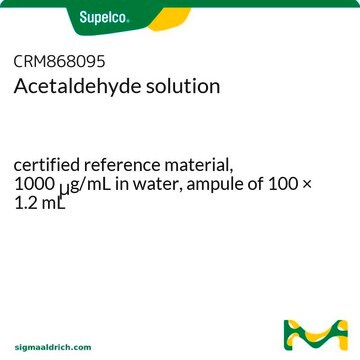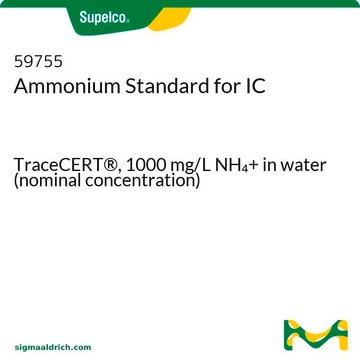506788
Acetaldehído
PESTANAL®, analytical standard
Sinónimos:
Etanal
About This Item
Productos recomendados
grade
analytical standard
Quality Level
vapor density
1.52 (vs air)
vapor pressure
14.63 psi ( 20 °C)
product line
PESTANAL®
CofA
current certificate can be downloaded
autoignition temp.
365 °F
expl. lim.
60 %
packaging
ampule of 1000 mg
technique(s)
HPLC: suitable
gas chromatography (GC): suitable
refractive index
n20/D 1.332 (lit.)
bp
21 °C (lit.)
mp
−125 °C (lit.)
density
0.785 g/mL at 25 °C (lit.)
application(s)
agriculture
cleaning products
cosmetics
environmental
flavors and fragrances
food and beverages
personal care
format
neat
storage temp.
2-8°C
SMILES string
CC=O
InChI
1S/C2H4O/c1-2-3/h2H,1H3
InChI key
IKHGUXGNUITLKF-UHFFFAOYSA-N
¿Está buscando productos similares? Visita Guía de comparación de productos
General description
Application
Legal Information
signalword
Danger
hcodes
Hazard Classifications
Carc. 1B - Eye Irrit. 2 - Flam. Liq. 1 - Muta. 2 - STOT SE 3
target_organs
Respiratory system
Storage Class
3 - Flammable liquids
wgk_germany
WGK 3
flash_point_f
-38.0 °F - closed cup
flash_point_c
-38.89 °C - closed cup
ppe
Eyeshields, Faceshields, Gloves
Elija entre una de las versiones más recientes:
¿Ya tiene este producto?
Encuentre la documentación para los productos que ha comprado recientemente en la Biblioteca de documentos.
Los clientes también vieron
Protocolos
-Tolualdehyde; Valeraldehyde; Isovaleraldehyde
Nuestro equipo de científicos tiene experiencia en todas las áreas de investigación: Ciencias de la vida, Ciencia de los materiales, Síntesis química, Cromatografía, Analítica y muchas otras.
Póngase en contacto con el Servicio técnico







